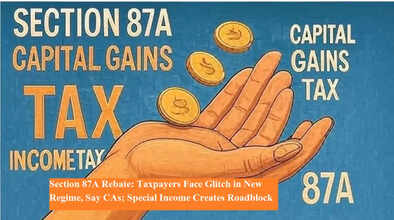Section 87A Rebate: Taxpayers Face Glitch in New Regime, Say CAs; Special Income Creates Roadblock

Several chartered accountants (CAs) across India have raised concerns over the Section 87A income tax rebate not being applied for many taxpayers under the new tax regime. The issue, they claim, is particularly affecting those whose total income—though within the exemption limit—includes special category income such as Short-Term Capital Gains (STCG) or Long-Term Capital Gains (LTCG).
Under current rules for FY 2024–25 (Assessment Year 2025–26), residents with a total income of up to ₹7 lakh under the new regime are eligible for a rebate of up to ₹25,000 under Section 87A. But CAs say the Income Tax Return (ITR) portal is not granting this benefit automatically when the income includes gains taxed at special rates, even though the new restriction on such income applies only from FY 2025–26 onwards.
CAs Highlight the Discrepancy
Chartered Accountant Abhas Halakhundi recently posted on X (formerly Twitter), questioning whether “future law is being applied in the past.” He pointed out that the Finance Act 2025 introduces a provision from FY 2025–26 denying 87A rebate on special rate income—such as LTCG under Section 112A or STCG under Section 111A—under the new tax regime. However, the ITR system appears to be enforcing this restriction for earlier years like FY 2023–24 and FY 2024–25, which is not in line with the law.
CA Himank Singla echoed this concern, noting that even if a taxpayer’s total income is within the rebate limit, the presence of LTCG or other special rate income means no rebate is granted.
Another professional, Pratibha Goyal, also confirmed via social media that the issue is widespread in the new tax regime filings.
What Section 87A Offers
Section 87A provides a tax rebate exclusively to resident individuals whose total income does not exceed a specified limit:
-
New Tax Regime – Income up to ₹7 lakh; maximum rebate ₹25,000.
-
Old Tax Regime – Income up to ₹5 lakh; maximum rebate ₹12,500.
The rebate amount is the lower of:
-
The actual tax payable (before cess), or
-
The maximum rebate limit specified under 87A.
Notably, the rebate does not apply to certain types of income taxed at special rates, such as long-term capital gains under Section 112A.
Rejection of 87A Rebate Claims in Revised ITRs despite High Court’s Interim Relief!!
— Abhas Halakhandi (@AbhasHalakhandi) March 1, 2025
Must Read for all professionals interested in 87A issue!!
📌Revised ITRs filed during the extended period granted by the Income Tax Department in compliance with the Interim Order of the High… pic.twitter.com/Dcr68AWA3F
Rules in the New Tax Regime
Under the new system, if your total income exceeds ₹7 lakh and includes special rate income (like STCG @ 111A or LTCG @ 112A), the ITR utility will automatically deny the 87A rebate. Even if your overall income is within ₹7 lakh, the rebate will only be applied if the slab-rate income alone is within the limit—special rate income is excluded from rebate calculations.
From FY 2025–26, the Finance Act 2025 formalizes this rule. But CAs argue that applying it to FY 2023–24 and FY 2024–25 is premature and unfair.
Old Tax Regime: A Different Story
In contrast, under the old regime, the rebate is granted as long as the total income—including special rate income—is up to ₹5 lakh. The ITR system generally applies this rebate automatically in most cases without issue.
Rebate u/s 87A for STCG u/s 111A
— CA Pratibha Goyal (@PratibhaGoyal) August 1, 2025
New Tax Regime: Not Available
Old Tax Regime: Available
Impact on Taxpayers
The current situation is leading to:
-
Unexpected additional tax liabilities for small investors and salaried individuals with capital gains.
-
Confusion among taxpayers about eligibility under the new regime.
-
Potential disputes if the issue is not clarified by the Income Tax Department.
Tax experts recommend that affected taxpayers manually verify their eligibility and consider filing grievances on the e-filing portal if they believe the rebate has been wrongly denied.
Bottom line: Section 87A was designed to provide relief to lower-income taxpayers, but glitches and premature application of future provisions are creating financial stress. Unless the I-T department updates the portal logic for AY 2025–26 filings, many eligible individuals could end up paying more tax than they actually owe.

